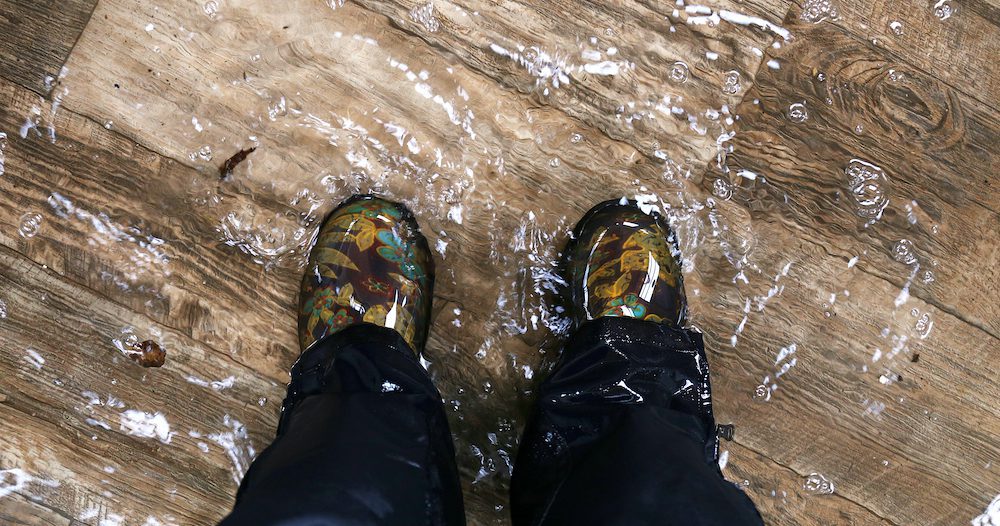What Does Home Insurance Cover? The Facts on Fire, Flooding, and More
Few things give new home buyers peace of mind about their real estate purchase as much as a solid home insurance policy. This ensures that if disaster strikes—in the form of a tornado, house fire, or otherwise—homeowners won’t be on the hook to foot the bill for expensive repairs on their own.
Exactly what does home insurance cover, though? Are there any key things homeowners might assume are covered that actually aren’t?
In this latest installment of our handy Home Buyer’s Guide to Home Insurance, we’ll explain what’s covered under most insurance plans—plus some key exceptions—so you know just how soundly you can sleep at night in your new home.
What does homeowner insurance cover?
A standard home insurance policy generally covers most (but not all!) natural disasters, theft, and accidents.
For instance, when a hailstorm does a number on your roof, you’ll file a claim and your home insurance company will help you pay to get it repaired. If the damage to your home has made it uninhabitable, your insurer may even pay for a hotel room until you can move back in.
“Generally, home insurance pays to repair or rebuild your property if it is damaged by fire, wind, lightning or other natural disasters,” says Josh Herz, president of Associated Insurance and Risk Management Advisors.
“It also covers your personal belongings, additional living expenses, and liability for you and others—if, say, when someone is injured on your property and litigates for damages.”
That said, all policies are different, so you’ll want to read through your home insurance documents carefully. Plus you might be surprised by what’s not typically covered in the fine print. Here’s what you need to know.
Does home insurance cover fire?
Whether you’re grappling with damage caused by a wildfire, lightning, electrical problems, a grease fire on your stove, or even a candle you left lit by accident, take heart that most house fires will be covered by home insurance.
And good thing too, since house fires are surprisingly common, with roughly one in every 350 insurance homeowners filing a claim due to fire or lightning each year. On average, insurance companies pay out $11,971 per claim to help repair fire damage.
Does home insurance cover water damage?
Water damage is typically covered by a standard homeowner insurance policy, as long as it was sudden and accidental—i.e., a pipe freezes, bursts, and floods your basement, or your hot water heater explodes.
Roughly one in every 50 insurance homeowners files a claim for water or ice damage every year. On average, insurance companies pay out $10,849 per claim. However, not all water issues are covered (more on that next).
Does home insurance cover water leaks?
While sudden water damage is typically covered, insurance companies generally won’t cover water leaks that appear gradually due to wear and tear, or are the result of poor maintenance.
In other words, if your roof is old and springs a slow leak, or if a pipe freezes and bursts because you didn’t shut off your water supply when you were away over winter break, good luck—you could be on your own.
It’s also important to know that your insurer will help cover the damage caused by water, but it probably won’t help pay to repair or replace the source of the damage. In other words, it won’t be buying you a new dishwasher if your own appliance flooded your kitchen.
Does home insurance cover plumbing?
Since plumbing problems can result in water damage, a standard home insurance policy should cover the problem if it appears out of the blue (i.e., a burst pipe). But if your pipes are just generally leaky, old, or poorly maintained, you might be on your own.
Does home insurance cover the roof?
This depends on what caused the damage. If your roof (as well as other parts of your house) gets pummeled by wind, hail, or a healthy tree falling, this is typically covered by home insurance.
It’s a good thing, too, since approximately one in every 40 insured homeowners suffers wind and hail damage each year, with claims paying out $11,200 to fix the problem.
Yet once again, your policy won’t help you out with normal roof aging and wear and tear. You’re responsible for maintaining your roof, which will need to be replaced around every 30 years (give or take, depending on what it’s made of).
If a tree falls on your roof because it was dead or rotted out, this could constitute neglect, and you could be on your own.
Does home insurance cover hurricanes?
This also depends, since hurricanes inflict damage in one of two ways—wind and water.
Damage from wind is typically covered, although your insurer may put in place a separate, higher deductible for wind damage caused by hurricanes.
Meanwhile, flooding caused by hurricanes is typically not covered by a standard homeowner insurance policy.
Does home insurance cover theft?
If someone breaks into your home and steals some of your belongings, your insurer will typically help you pay to replace those stolen items. Similarly, if a thief damages your home during the break-in, your home insurance company will help you pay for repairs, too.
Theft is surprisingly common, with approximately one in every 400 insured homeowners suffering property damage or loss caused by theft. On average, these claims pay out $4,391 annually.
Does home insurance cover pet bites and other injuries?
If your dog (or cat!) bites someone in your home, or if a visitor trips and falls down the stairs, your guests may want you to pay for their ensuing medical bills. You might also need to pay for lost wages if the injury prevents them from working.
Most standard insurance policies include what’s known as liability coverage, which means that your insurer will help pay for these expenses if someone gets hurt on your property.
This is good for you, since the average claim for bodily injury is roughly $45,000. Approximately one in 900 insured homeowners file claims of this type every year.
While home insurance covers many calamities that might hit your home, most policies don’t cover everything. Curious to know what these notable exceptions are? More on that in a future installment of this guide. Stay tuned!
The post What Does Home Insurance Cover? The Facts on Fire, Flooding, and More appeared first on Real Estate News & Insights | realtor.com®.

FIRST TIME HOMEBUYERS
Homebuyers: For access to all listings and to find a homebuyers real estate agent that will represent only your interests call 800-935-6222 or click the button below to connect with MABA. At MABA we got you!
First Time Home Buying in Massachusetts
 MABA Buyer Agents help first time home buyers reduce the stress and frustration normally associated with buying a home or condo – especially for first time home buyers.
MABA Buyer Agents help first time home buyers reduce the stress and frustration normally associated with buying a home or condo – especially for first time home buyers.
As a first time homebuyer in Massachusetts, you can turn to our non-profit organization to help you understand and navigate the complexities of the entire Massachusetts real estate transaction, from mortgage pre-approval until you are handed the keys to your new home or condominium. Each of our member buyer's brokers and agents works only for their buyer-clients and never for the seller of the home or condo that their buyers want to buy.
MABA Buyer Agents will take the time to learn about you and your real estate goals, help you understand your options, including first time home buyer programs, properties and/or condominium associations, estimate real property values and put together a negotiating strategy to help you increase the odds of getting your offer accepted in our competitive Massachusetts real estate market. After advocating to get your offer accepted, your MABA buyer's agent will be there for you at your home inspection and help you protect your deposit through the inspection, purchase & sale and financing contingency periods.
You can buy your first home or condo with confidence knowing that your MABA buyer agent is committed to saving you time and money and helping you make your best home buying decision.
HOMEBUYERS BEWARE! Book Review
This book is an excellent first step in a complicated process.

BEWARE the cards are stacked against you! Get Tom Wemett's book, learn why are different from other
Buying a home is like buying a car, on steroids. It’s the biggest investment you are likely to make so the stakes are incredibly high. I knew that having an agent represent me was a good idea.
What I hadn’t grasped was how important it is to find one who is not connected with the selling side in any way—through an agency that also represents sellers, as most do, at least in Mass. In researching buyer agents, I found Tom through the Mass. Assoc. of Buyer Agents (MABA).
Selecting the Right Homebuyer's agent
 Unlike most other real estate agents, a MABA home buyer's broker never represents both a buyer and seller in the same transaction so you never have to worry whether a MABA agent is really looking out for your best financial interests. A MABA buyer's agent acts as your advocate, real estate educator, advisor and negotiator, always loyal to you and dedicated to helping you find and buy the best home with the best terms at the price and showing you which homes to avoid along the way.
Unlike most other real estate agents, a MABA home buyer's broker never represents both a buyer and seller in the same transaction so you never have to worry whether a MABA agent is really looking out for your best financial interests. A MABA buyer's agent acts as your advocate, real estate educator, advisor and negotiator, always loyal to you and dedicated to helping you find and buy the best home with the best terms at the price and showing you which homes to avoid along the way.
Fewer than one percent of the agents and brokers in Massachusetts meet our high standards.
Whether you are ready to buy now or just beginning your home buying journey, click here to choose a Great Buyer's Agent to answer all of your home buying questions!
Article From: "Sarah Kuta" Read full article
Get Started with MABA
For no extra cost, let a MABA buyer agent protect your interests



